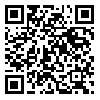1- Education , Ali_naseri1356@yahoo.com
2- Kharazmi university
3- 3. Associate Professor
2- Kharazmi university
3- 3. Associate Professor
Abstract: (5465 Views)
The purpose of the present study was to determine the role of errorless and error full training on aiming task learning of normal teens and intellectual disability ones. 20 intellectual disability teenagers were selected from an exceptional school and 20 normal children from the Normal school in Ardebil in the range of 11 to 13 years old (M = 12, SD = 0.8). Normal and intellectual disability individuals were randomly assigned to two errorless and error full training groups according to Wechsler's intelligence test and Alloway's working memory test. The task was to throw basketball balls in the form of a chest pass to the targets with concentric circles. These goals were set at the height of the people's chest in the wall. The subjects performed 200 exercise attempts at the acquisition stage in five training blocks. Single and dual task transfer tests were carried out immediately, 24-hour latency and one week's delay. The data were analyzed using two way repeated measures analysis of variance analysis (ANOVA). The findings showed that the group had the least memory involvement and the least error in both subjects type, in the single task test [P<0.05 and in the dual task test were better [P<0.05 . The normal errorless group was not better than the intellectual disability errorless group, but the normal error full group was better than the intellectual disability error full group. The findings of this study are consistent with the Adam's closed loop theory, the reinvestment theory, and somewhat consistent with the estimates of the challenge point framework regarding the error in the acquisition stage, but these findings are somewhat contradictory with the estimates of the schema theory.
Keywords: Errorless training, explicit learning, implicit learning, intellectual disability and Working memory
Type of Study: Research |
Subject:
motor behavior
Received: 2023/05/20 | Accepted: 2024/01/19 | ePublished ahead of print: 2024/01/19
Received: 2023/05/20 | Accepted: 2024/01/19 | ePublished ahead of print: 2024/01/19
Send email to the article author
| Rights and permissions | |
 | This work is licensed under a Creative Commons Attribution-NonCommercial 4.0 International License. |






